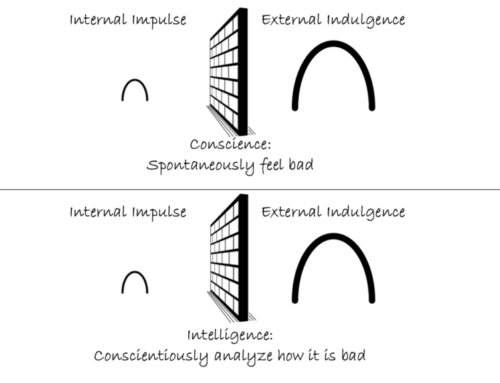While striving to live according to principles, if we falter, we become disheartened. Even if we introspect to find out why we fell, that introspection soon degenerates into a fault-finding tirade. We beat ourselves up for falling to temptations and conclude that we are just hopelessly lost cases.
Berating ourselves can be good if it comes from a healthy conscience. But when berating ourselves is all that we do and it leaves us disheartened in our endeavors for self-improvement, then the agent berating us is not our conscience – it is our ego. The ego wants the gratification of being self-controlled and gets frustrated when our lapses deprives it of that gratification.
To grow, we need to shift from the ego’s faultfinding mode to the intelligence’s fact-finding mode. The self-flagellating mentality may continue its tirade by declaring that we are just too foolish to resist temptation. But this tirade is also a trick of the ego – even if we acted foolishly, our beating ourselves up for being foolish only compounds the folly. We need to introspect to find out what rationalization the mind used to make the foolish appear sensible or at least acceptable. When we introspect with a dispassionate objective mood, as adopted by, say, a psychotherapist with a client, we approach our inner world on a fact-finding mission. Thereby, we can detect and correct the deluding rationalization.
More importantly, such introspection can lead us deeper to understand what rationalization persuaded us to disconnect ourselves from Krishna. When we thus use our intelligence, as the Bhagavad-gita (03.43) recommends, to situate ourselves on the spiritual platform, then our introspection empowers us to better resist temptation and, more importantly, better absorb ourselves in Krishna, thereby transcending temptation.
By thus focusing on how we went wrong internally when we erred externally, we progress inside-out towards self-improvement.
To know more about this verse, please click on the image
Explanation of article:
Podcast:



Leave A Comment